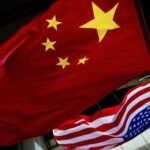China And Singapore Pave The Way For Sustainable Investments – The objective of the task force is to enhance the collaboration between two countries in the areas of green and transition finance. The main focus is on promoting greater partnership between public and private sectors towards achieving a low-carbon future in the region. To achieve this goal, Green Finance Taskforce (GFTF) plans to work together to establish financial standards, products, technologies, and definitions that can reduce carbon footprints.
By bringing together participants from both public and private sectors, the task force aims to implement concrete initiatives that will encourage capital flows to support an inclusive and reliable transition towards a low-carbon future in China, Singapore, and the region. Gillian Tan, the Assistant Managing Director and Chief Sustainability Officer of MAS, emphasized the significance of the task force in improving connectivity in the sustainability bond market.
People Also Read: Central Bank of Bolivia Selling Dollars Directly to Citizens as Devaluation Fears Rise
The aim is to establish a mutual exchange of green and transition bond products between the Monetary Authority of Singapore (MAS) and People’s Bank of China (PBC). This will facilitate the alignment of taxonomies and definitions for their respective transition activities. Moreover, the technology aspect of GFTF will involve the participation of MetaVerse Green Exchange, a licensed cryptocurrency exchange based in Singapore, and Beijing Green Exchange, a Beijing municipal government-approved firm. Their role is to assist in promoting the adoption of sustainable finance.
Additionally, they have been assigned the responsibility of testing digital green bonds with carbon credits. It has also been reported that Chinese banks are allowing regulated cryptocurrency companies to open bank accounts, and some are even serving as a payment intermediary for these platforms. According to the Wall Street Journal, the Bank of Communications, which is state-owned, is currently discussing the possibility of opening accounts for regulated companies.
Moreover, ZA Bank, the largest virtual bank in Hong Kong, is serving as the settlement bank for these crypto companies. These initiatives are a testament to the region’s commitment to achieving a low-carbon future. The task force has played a crucial role in fostering collaboration between the public and private sectors towards this common goal. It is evident that China and Singapore are taking proactive measures towards sustainable and green finance, setting a benchmark for other nations to emulate.
READ MORE
World Economic Forum Believes Crypto Will Remain Key Technology
Wikipedia Stops Accepting Cryptocurrency Donations Citing Community’s Environmental Concerns
Bitso to Offset Carbon Emissions From the Trading Platform’s BTC, ETH, ERC20 Transactions




